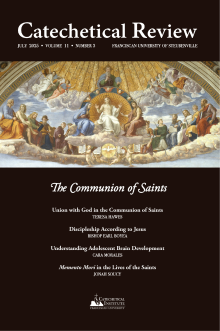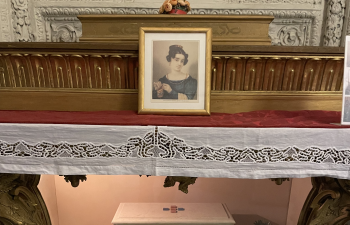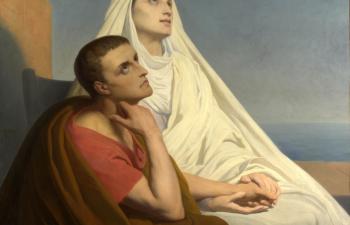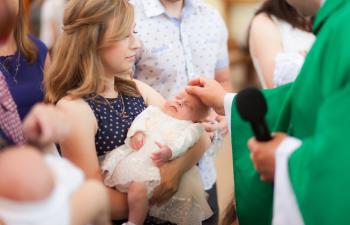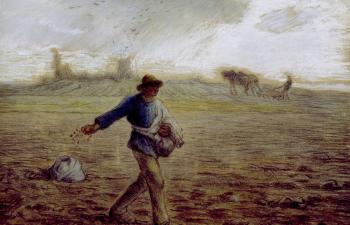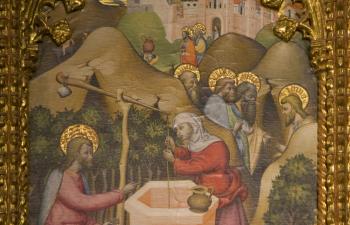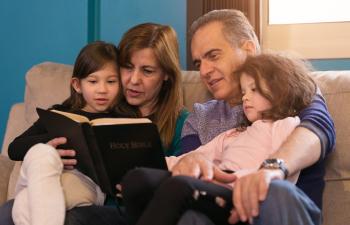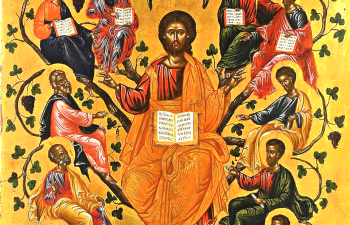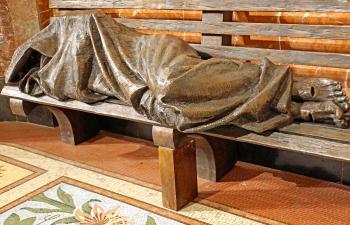 When I had been a mother for about 20 years and was leading a women’s Bible study at church, I asked a group of mothers with young children to give me one word that would complete this sentence: Motherhood is a time of . . . “exhilaration,” “chaos,” “frustration” and “creativity” were some of the answers they called out to me. Then I shared with them a conclusion about motherhood that I had been coming to in those years. It was an idea I wish I had known when I first began having children, so I wanted to see if perhaps it could make a difference for them. I suggested that, above everything else, motherhood is preeminently a time of conversion. Why?
When I had been a mother for about 20 years and was leading a women’s Bible study at church, I asked a group of mothers with young children to give me one word that would complete this sentence: Motherhood is a time of . . . “exhilaration,” “chaos,” “frustration” and “creativity” were some of the answers they called out to me. Then I shared with them a conclusion about motherhood that I had been coming to in those years. It was an idea I wish I had known when I first began having children, so I wanted to see if perhaps it could make a difference for them. I suggested that, above everything else, motherhood is preeminently a time of conversion. Why?
We looked at a passage in St. Matthew’s Gospel to understand what conversion means, why it is necessary, and why motherhood offers women deep and abiding opportunities to experience it. In that passage, the disciples asked Jesus, “Who is the greatest in the kingdom of heaven?” (18:1). In reply, he made it clear that the more important question is: Who will get in? He said that those who seek to enter heaven must “turn [be converted] and become like children” (18:3). Even the disciples needed to understand that it was not enough to be an admirer of Jesus. They needed to consciously turn away from a life of self-reliance and become like children, with simple trust in and obedience to Jesus. Thus, he established the necessity of conversion. He illustrated the point when he called a child out of the crowd to come to him. The child obeyed, putting himself (literally) in Jesus’ hands, who then set the boy in their midst. Jesus told the disciples, “Whoever humbles himself like this child, he is the greatest in the kingdom of heaven” (18:4). So, what does all this have to do with motherhood? Jesus said it best: “Whoever receives one such child in my name receives me” (18:5). What did he mean?
To receive a child in the name of Jesus is what we do when we have our children baptized. A child who has been baptized into Jesus and his Church has been made part of his Mystical Body. In a very real way, Jesus himself has taken up residence in our homes through our children. He is there to save them—and us. Throughout our lives with them, we will hear Jesus call to us, always beckoning us to turn from the small, cramped, ill-fitting life of the self and become what we truly are: children of God. In other words, he will use our lives with our children to turn us from self-love to self-donation, making us ready for union with God. How will we, as mothers of children from infancy to adult life, hear his voice?
“In Pain You Shall Bring Forth Children.” —Genesis 3:16
As one of the consequences of breaking faith with him, God told Eve, our first mother, that bringing children into the world would be painful, hard work. He was not simply speaking about the labor of a child leaving the womb. He was referring to all the challenges that we, as fallen people, would face as we raise children in a fallen world. Raising children is not easy, but when we receive our children in the name of Jesus, we receive him, too. We are not alone in it, and he never tires of reminding us that he is there.
We will hear Jesus call at 2:00 a.m., when a baby cries out (or a teenager closes the front door). Our bodies want rest and sleep. But Jesus will say to us, “You are not your own; you were bought with a price. So glorify God in your body” (1 Cor 6:20). We can either simply endure the hard, physical work of motherhood (lost sleep, picking up toys off the floor, absorbing hundreds of interruptions, driving countless miles to school, sports, music lessons, etc.), with its temptation to self-pity, or we can see it as an opportunity to lay down our lives for another. We can learn concretely that our bodies are meant for God, not for ourselves, and we can thank Jesus for every reminder he gives us of that great, foundational truth of conversion.
We will hear Jesus call every time we discipline a child. In a battle of wills, whether with a toddler or a teenager, we will hear his consolation: “I came not to call the righteous, but sinners” (Mt 9:13). Jesus came to save our children from their sin. He came also to save us from our pride when we are horrified that we have not raised perfect children and that we, alas, are not perfect. We are shocked to discover how impatient, angry, and teeth-grindingly impatient we can be. We can either nurse our injured pride, or we can acknowledge with humility that we do not know what in the world we are doing and need divine help. We can also thank Jesus for giving us a living picture in our tantrum-throwing two-year-old or our aloof, independent teenager of what our own disobedience looks like in our Father’s eyes. We have been wayward children, too.
Children grow to adulthood (Lord willing). Is the work of conversion over once they are in charge of their lives instead of us? Now that I have been a mother for 44 years, I know those first years primarily teach us to love God with our bodies, letting them become, as St. Paul wrote, “a living sacrifice, holy and acceptable to God, which is your spiritual worship” (Rom 12:1). Loving God with our bodies can mean hard, physical work—work that can be exhausting and often stressful. Then, as our motherhood continues into our children’s adult years, it must deepen into “a still more excellent way” (1 Cor 12:31).
“Love Bears . . . Believes . . . Hopes . . . Endures All Things. Love Never Ends.” —1 Corinthians 13:7–8
When our children grow to adulthood, we are faced with a profound and humbling reality: They are not us. They make their own decisions about how to live their lives. Our job as mothers was to raise them to be disposed toward love of God and neighbor, to live the fullness of the grace they received when we had them baptized into Jesus and his Church. This includes our need to be good examples of what we have taught them. We cannot simply be talking heads. Our children need to be able to see daily that we practice what we preach. Just as important, when we fail, they need to see true repentance and amendment of purpose. If we owe an apology, we must give it. If we owe forgiveness, we must give that, too.
When they become adults (best to consider this happens at age 18), we need to make a course correction. Having done what our vocation required of us in the first years, we must begin releasing them to God for the work he wants to do in them. This is not easy. In many ways, it is much harder than the physical work required of us in raising them. We are still their mothers, of course, and mercifully, Jesus is still calling them and us to conversion in our lives with them. How will we hear his voice now?
We will hear him when we discover that in their adulthood our children make some bad decisions. They date the wrong people; they stop going to church; they enjoy the wrong entertainment; they have the wrong aspirations or—even worse—no aspirations at all. We can sometimes find that instead of the children who once relied on us completely and willingly for everything, they are adults who put up a wall of resistance when we try to guide them (gently or forcefully) into living the way we want them to. We find ourselves once again in a battle of wills, but it is not really their wills we are fighting. These times become a test of our own will—can we trust Jesus with our children?
Learning to answer yes to this question can be as terrifying as anything we have yet faced in motherhood. What if they enter into bad marriages? What if they turn their backs on practicing the Catholic faith in which they were lovingly raised? What if they become addicted to substances or behaviors that seriously endanger them? The “what if” list is endless. As frightening as these questions can be, it is in learning to face them in faith, hope, and love that our conversion grows deeper and more fruitful. Many Catholic parents have heard from people they respect that their job—their most important job—is to get their children to heaven. What an unnecessary burden this becomes on many of us! None of us can get anyone other than ourselves to heaven, and even that is not something we can do. Jesus, by his grace and love, gets us to heaven when we respond to and cooperate with him. We cannot do this for our children. Our real job as parents is to do what our vocation calls us to do: From infancy to adulthood, we give them every reason to love God with all that they are. We do this first by loving him that way ourselves and then by proper instruction, good example, and lots of prayer. When they become adults, we need to live the way St. Monica did. St. Augustine wrote of his mother: “She said little, preached not at all, loved deeply, prayed without ceasing.”
If we have given our children to the Lord, we should not fear the next step in their lives and ours when Jesus takes us at our word. They belong to him; he can be trusted with them. For us, it is time to listen to the words of St. Paul: “Have no anxiety about anything, but in everything by prayer and supplication, with thanksgiving let your requests be made known to God. And the peace of God, which passes all understanding, will keep your hearts and your minds in Christ Jesus” (Phil 4:6–7). We must let the great adventure of parenthood unfold.
But, we ask, what happens when our adult children reject everything we raised them to believe and do? When the path they choose for themselves cannot lead to the happiness they seek outside of the covenant of faith? What kind of peace can we possibly have then?
“When [the Son] Came to Himself He Said ‘. . . I Will Arise and Go to My Father.’” —Luke 15:17–18
For those of us who have prodigals among our adult children, there is great wisdom in St. Luke’s telling of the parable of the Prodigal Son. The son made a selfish, unloving request of his father, who, nevertheless, granted it to him. Then, the son took his inheritance money and bolted from his family, his home, the entire life his parents had hoped he would live. He squandered the money in loose living, until he had nothing left. He was reduced to sharing food with the pigs he was hired to care for. One day, when he had experienced all the consequences of the life he had chosen, he “came to himself.” He remembered his father as a just and generous man who treated even his servants with respect. And that memory of his loving father—the last one he had as he departed his home in a huff—moved him to repentance and a desire to return home. What can we learn from this?
Picture that final scene between the rebellious son and his wronged father. It was the memory of that scene that revealed to the son, in his degradation, his father’s character. Finally, he was able to recognize his father’s great love—even as that love allowed the son to make a terrible mistake. There must not have been any yelling, reproving, warning, threatening, or rejection. Even in that awful moment, when the son expressed nothing but his desire to make a complete break with his family, the father kept alive the bond of love. It was that bond of love that, after much suffering and many tears on both sides, reached the son’s heart and changed everything.
When our children become prodigals, the greatest need we have is to maintain the bond of love, with God’s help. Above all else, no matter what we must say or do in response to their choices, it must always be conducted in love. For, in truth, we ought to love our children much more than we love being right. In those difficult times, we will hear Jesus calling us into the very deep waters of our conversion, to love our prodigals in the same way God loves us. When we do, we step into the pure light of divine love, with all its attraction and power.
We do not know the harvest of this love that we plant in their lives, but we plant it anyway because we know that doing so is our vocation as parents. Then, we pray for the watering and blossoming of that seed of love by the Holy Spirit for the rest of their lives. Someday, we, too, might live the joy of the father in the parable, who ran out to meet his son from a far way off. This is our hope when all else can seem very dark, indeed.
“When She Is Delivered of the Child, She no Longer Remembers the Anguish, for Joy that a Child Is Born into the World” —John 16:21
Many of us mothers have the remarkable experience of becoming grandmothers. Our “official” work of mothering our children has ended. In our grandmother years, we taste the exquisite fruit of our labors. The hard work is over, but is the conversion of mothering over? Do we still hear the voice of Jesus speaking to us?
Released from the stress of total responsibility for these little ones, Jesus’ voice often comes to us the way it did to Jonah. He balked and resisted doing things God’s way until his three days of turbulence in a whale’s belly. Then, mercifully, “the word of the LORD came to Jonah the second time” (Jon 3:1). Seeing things differently, he did things God’s way this time. When we are grandmothers, we have the great gift of perspective, which we did not have when our children were young. Their futures were still a mystery to us, and we felt the burden of doing the best job we could. We made mistakes; we failed our children (and ourselves); we have regrets. When we had the work of maintaining a household, of keeping all our balls in the air, of carrying on when we were sleep deprived or sick, sometimes our children’s interruptions unnerved us. It became too easy for our children and their concerns to become line items on our ever-growing list of things to get done.
By the time we are grandmothers, we usually have the luxury of more time, more availability to our grandchildren than we had with our own. That is when we hear the voice of Jesus calling us to try mothering again, this time with the opportunity to do it his way. Unhurried and with greater patience, we begin to understand how so much of that “anguish,” as Jesus called it—the hard, exhausting physical work, the emotional stress, the tears we shed as we brought our children into and up in this world—was worth it. St. Paul agreed with this: “I consider that the sufferings of this present time are not worth comparing with the glory that is to be revealed to us” (Rom 8:18). Our children grew up. They turned out well. The pain was temporary. As grandmothers, the confidence this gives us, won only by our long travail of motherhood, changes everything. We do not experience these grandchildren as “projects.” We see and live with them as little people from whom we do not expect adult behavior. At last, we can richly, deeply, and with profound gratitude know, in all its fullness, the “joy that a child is born into the world.”
“Behold, Your Mother!” —John 19:27
Throughout our long journey of conversion to Jesus in motherhood, the enduring presence of Mother Mary is lovingly given to us. She is the gift Jesus gave us from his cross. Her own growth in wisdom and understanding of her mission of motherhood was extensive, often terrifying—just as ours can be. She experienced great sorrows and great joys. For her labor and her love she was crowned Queen of Heaven. She is a woman who understands every part of motherhood. In her work of advocacy for us, she desires to see our problems (“They have no wine” [Jn 2:3]) and take them to her Son. Her loving word to us in all the difficult moments of our own mothering is simple: “Do whatever he tells you” (Jn 2:5).
The fact is: everything that is difficult in motherhood has within it the seed of conversion. In every struggle, on every occasion when we feel stretched beyond our limits, with every child Jesus is there, calling out to us. We have only to hear his voice and respond.
Art Credit: Adobe Stock.
This article originally appeared on pages 30 - 38 of the print edition.
This article is from The Catechetical Review (Online Edition ISSN 2379-6324) and may be copied for catechetical purposes only. It may not be reprinted in another published work without the permission of The Catechetical Review by contacting [email protected]



